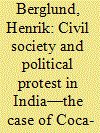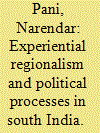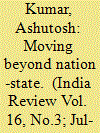| Srl | Item |
| 1 |
ID:
155045


|
|
|
|
|
| Summary/Abstract |
The Indian economic and political systems have recently opened up for increased foreign investments, which has resulted also in new forms of popular resistance. This article analyzes the campaign launched against the Coca-Cola-Company in Plachimada, Kerala, India, which in 2004 resulted in the closure of its bottling factory after accusations of water depletion and pollution. The analysis in the article is based on the theoretical concept “political opportunity” and concludes that the decision to close the plant was the result of an efficiently run popular campaign based on a tightly knit group of local activists, held together by a tribal identity. Vital for the success was also the help the group attracted by national and international civil society support groups and media, as well as the link between both media and civil society towards the political parties and the state.
|
|
|
|
|
|
|
|
|
|
|
|
|
|
|
|
| 2 |
ID:
155044


|
|
|
|
|
| Summary/Abstract |
Regional identities have periodically asserted themselves in Indian politics, both before and after Independence. The intensity of this regionalism has, however, tended to vary quite substantially from state to state and over time, ranging from a somewhat benign influence on state politics to demands for secession. These differences are typically explained in terms of specific local political conditions. While the local is undoubtedly important, this article argues that a larger theoretical explanation is also possible: Once we recognize that regionalism operates in multiple spaces, it becomes evident that the way these spaces are experienced has its influence on the practice of local politics. The article goes on to match its theoretical expectations with the politics of regionalism in the neighboring south Indian states of Karnataka and Tamil Nadu.
|
|
|
|
|
|
|
|
|
|
|
|
|
|
|
|
| 3 |
ID:
155043


|
|
|
|
|
| Summary/Abstract |
The article refers to the processes that have been critical to the emergence of states as significant categories for the analysis of politics in India after a considerable period of academic neglect. It is in this context that the article considers the following research questions for discussion while referring to the state politics literature: what has been the contribution of the “first generation” of state-specific studies and to what extent has the “second generation” of inter-state comparative studies been able to take this forward? What could be the specific advantages of inter-state studies over single case studies? Finally, the article argues in favour of a need to develop further what may be considered the “third generation” of studies in the discipline, that remain comparative in nature but are in search of a much-nuanced grounded analysis; this would move beyond state-specific or inter-state studies and start taking up intra-state comparative studies, focusing on historical-cultural substate regions that have emerged as political (and economic) units within and across the constituent states of the Indian Union.
|
|
|
|
|
|
|
|
|
|
|
|
|
|
|
|
| 4 |
ID:
155046


|
|
|
|
|
| Summary/Abstract |
Lloyd and Susanne Rudolph were world renowned political scientists and iconic academic couple who devoted six decades of their lives to teaching and researching India and South Asia. The liberal-centrist Rudolphian framework is clearly evident in their numerous works. Their writings show the innovativeness and interpretative richness of methodological pluralism questioning the hegemony of western theories and categories. The Geertzian notion of “culture bound” contextualism was central to their ideas on concept formation and “situated knowledge” paradigm. The phrases like “situated knowledge,” “self as other,” “imperialism of categories,” “modernity of tradition”, “living with difference,” and “post-modern Gandhi” provided newer conceptual tools and vocabularies in their writings. Writing within the broader framework of liberal-centrism, they continued to counter generalizations and deepen our understanding about the puzzle of Indian democracy and nature of the Indian state.
|
|
|
|
|
|
|
|
|
|
|
|
|
|
|
|